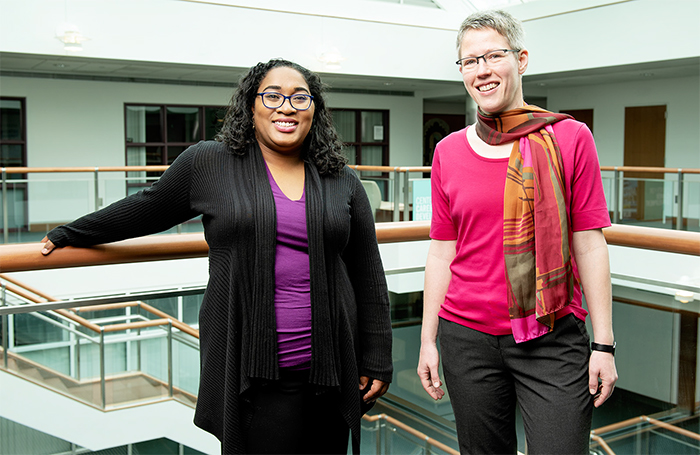
Photo: Webb Chappell
Janai Mungalsingh ’08 (left) and Katrin Fischer, MBA’15
Eager kids with open minds who are unafraid to take risks. That describes the students who typically enroll in Babson’s Summer Study for rising high school juniors and seniors, says Katrin Fischer, MBA’15, faculty director for the program and adjunct lecturer in arts and humanities.
The cohort of about 130 shares other traits. “I would say they’re naturally curious,” says Janai Mungalsingh ’08, Babson’s youth programs curriculum designer. Adds Fischer, “They have a kind of openness about the unknown, about new or unstructured experiences.”
During the four-week program, students spend mornings in the classroom; the emphasis is on Babson’s Entrepreneurial Thought & Action methodology. The course, taught by Babson faculty, covers topics ranging from business law to sustainability to presentation skills. This last one is key because, in true Babson fashion, the course builds toward a pitch of a business idea the students, working in groups, have developed. Along the way, they test their ideas, build prototypes, and receive feedback. Past student ventures have included Panana, which supports education in developing countries through sales of notebooks made from banana leaves, and Kover, a clear skin patch that allows users to sample beauty products in stores.
Afternoons are spent in activities that reinforce the morning’s lessons. These might include company site visits, networking events with local entrepreneurs, or student-run forums. Mungalsingh, who oversees this aspect of the program, notes that students often react to activities in ways that show their understanding of lessons learned in the classroom. “I get the pleasure of seeing those ‘aha moments,’” she says.
Admission to the program is competitive—the acceptance rate is around 33 percent—and students have come from about 37 countries. It might seem natural that many Summer Study participants eventually end up as Babson students, and, in fact, during the program’s eight-year history, about 10 percent of enrollees have matriculated at the College. But the program wasn’t designed to put Babson on the radar of prospective students, or vice versa. Mungalsingh says, “It was a way to create access to and share this methodology with young people everywhere.”
Participants gain valuable life skills, says Fischer. “Even if they do not go on to be entrepreneurs, we are all entrepreneurs of our own lives,” she notes. Students learn to cope with ambiguity, change, and failure.
Some students waste no time putting their skills to work. Mungalsingh recounts how, when construction limited use of the Webster Center, students—who wanted access to a gym—advocated for an arrangement with Boston Sports Clubs and negotiated a rate for the program. “And it was a great rate,” she says.
Students invariably offer enthusiastic feedback about the program, says Mungalsingh, who is equally ardent about her work with the students. “It’s energizing to see their passion, their dedication, their excitement,” she says.
But Mungalsingh is particularly pleased at the comments she hears from parents. “They call me and say, ‘What did you do to my child?’” she says. “‘They’re thinking for themselves, they’re doing their own thing, and they didn’t even ask me for help.’”—Jane Dornbusch
Applications for 2019 Summer Study are now open. The application closes March 1. Apply now »
